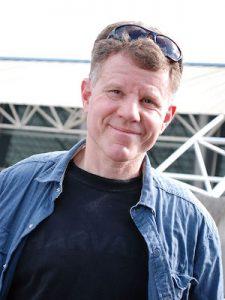Who’s Gonna Love Me Now? – Interview with Barak Heymann

Brothers Barak and Tomer Heymann have collaborated on nearly 20 documentary projects since Barak joined the company in 2003. Drawn to stories of people “living on the fringe,” they have produced feature length documentaries about a joint Jewish and Arab school, about legendary Israeli choreographer Ohad Naharin, and an intimate portrait about their extended family in Israel and the United States. Barak Heymann recently spoke with the BJFF’s Ken Shulman.
Ken Shulman: Where did the idea for Who’s Gonna Love Me Now originate?
Barak Heymann: My brother Tomer met Saar, the main character of the film, some 20 years ago in a gay bar in London. They had a one night stand, and in the morning he saw Saar put on a yarmulke, and listened as Sar began to tell Tomer his family story. This is the story we tell in the film. At the time when they met, and for several years afterwards, Saar didn’t want his story published or made into a film. But in 2011 he decided it was time and said let’s go for it.
KS: Who’s Gonna Love Me Now reminds me of the beginning of Anna Karenina, about how all happy families are alike, and each unhappy family is unhappy in its own way. The family relationships you depict in your film are very intimate, conflicted, and in some cases even compromising. How were you able to convince his family to appear as themselves and speak openly about their emotions and expectations and disappointments?
BH: I think they agreed to appear in the film because they knew how much we respected and liked Saar. It was clear to us from the start that even though their relationship with Saar for many years was quite difficult, they never stopped caring for him, or considering him one of them. I think they saw the same dedication in us.
KS: So much of the family dynamic is worked out in the film: resentment; jealousy; hurt; acceptance. It’s almost as if you and your brother are therapists.
BH: I don’t know if I care to think of ourselves as therapists, but it’s true in a way. Many people, including myself, need an intervention or suggestion from a helpful friend before they find the courage to do things they know they need to do. None of the conversations in this film are staged. Everything is realistic. Yet I don’t think those conversations would have happened without our encouragement, without us asking them to take a chance and talk about their issues.
KS: So in some ways you and your brother were a catalyst. Yet you’re still there in the emotional trenches, but there with a camera, observing and recording incredibly intimate family stuff. How does that work?
BH: That is our job, to get people to like and trust us. And you do that by spending time with your subjects. Not just while you’re filming them, but at other times as well. As they get used to you, they are more able to be themselves. Both you and your camera become less obtrusive.
KS: Did it help that you and Tomer had essentially done the same thing with your own family in The Queen Has No Crown?
BH: The Queen Has No Crown is about Tomer’s personal life, his different boyfriends, and how our family deals with having three members who left Israel for the United States. The process was interesting, surprising, and sometimes embarrassing for all of us in the family. But along the way we learned how to ask the right questions, and how to deal with being uncomfortable. In many ways, that project gave us the direction and inspiration to make “Who’s Gonna Love Me Now.
KS: Tomer was also an inspiration for you in your career choice.
BH: I followed my brother into documentary filmmaking after I saw an audience react to his first film. I was amazed that a film could change peoples’ attitudes about so many things—and in this case about homosexuality. So when he invited me to make a film with him about an Arab and Israeli school, I jumped right int. I like the idea that film has power to drive change. It may not be change on a galactic scale, or even on a national scale. But it’s possible for you as a filmmaker to get people to have another look at their convictions. If there is one parent who because of this film is better able to accept his gay son or daughter, I’ll consider it a great success.
KS: Film, at least films like this one, can also change the people who are in it.
BH: Absolutely. This film was supposed to be about a guy who substitutes the love of a surrogate family—in this case the London Gay Men’s choir—for the love he doesn’t feel he’s getting from his real family in Israel. At the outset of this project, no one ever dreamed that Saar would ever consider returning to Israel and reconciling with his family. But something amazing happened during the filming. And I admire every member of his family for their courage and willingness to be open and honest. I even admire them for saying things I don’t agree with, because at the end of the day all of them were able to do something that few people in this world ever do: to change.
 Ken Shulman has covered soccer World Cups, alpine ski races, sumo wrestling, bloodless bullfighting, and wild boar hunting for NPR’s “Only A Game,” Newsweek, The New York Times, The International Herald Tribune, and the BBC. He is a two time RTNDA “Edward R Murrow” broadcast award winner and was selected as Champion of Justice by the National Association of Criminal Defense Attorneys. He is also a reading and writing tutor at Cambridge Ringe and Latin High School.
Ken Shulman has covered soccer World Cups, alpine ski races, sumo wrestling, bloodless bullfighting, and wild boar hunting for NPR’s “Only A Game,” Newsweek, The New York Times, The International Herald Tribune, and the BBC. He is a two time RTNDA “Edward R Murrow” broadcast award winner and was selected as Champion of Justice by the National Association of Criminal Defense Attorneys. He is also a reading and writing tutor at Cambridge Ringe and Latin High School.




